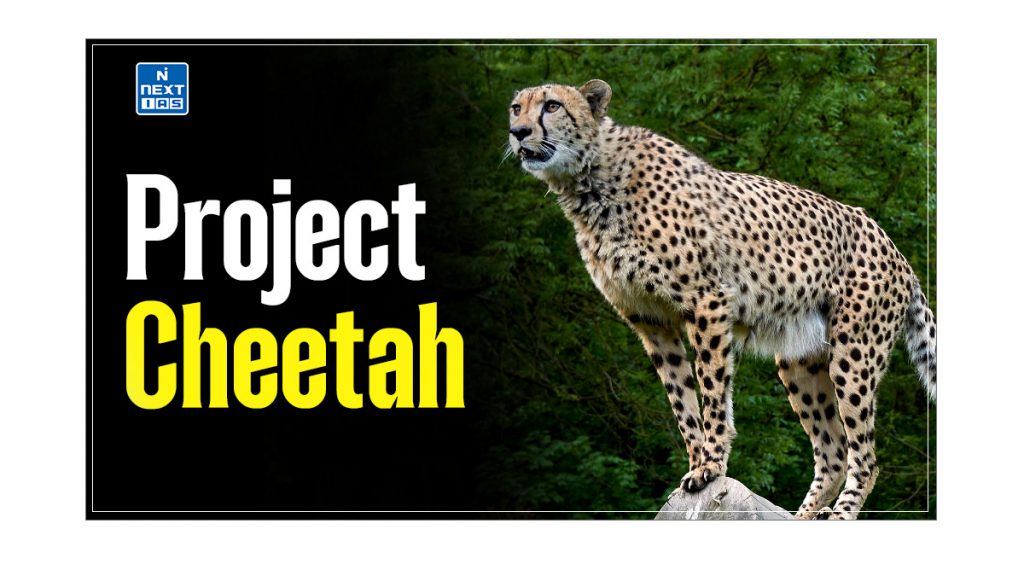
Project Cheetah is a groundbreaking initiative by the Government of India to reintroduce cheetahs into the wild after their extinction in the country in 1952. This project is significant as it represents the world’s first inter-continental wild carnivore translocation effort and aims to restore ecological balance and enhance biodiversity in India. This article aims to study in detail the objectives, progress, and impacts of Project Cheetah on wildlife conservation and ecosystem restoration.
About Project Cheetah
- Project Cheetah is an initiative by the Government of India to reintroduce cheetahs into the wild after they were declared extinct in the country in 1952.
- Project Cheetah involves importing cheetahs from Africa and establishing them in suitable habitats within India, particularly in national parks and wildlife reserves.
- The goal of Project Cheetah is to restore the ecological balance, promote biodiversity, and enhance wildlife tourism and conservation efforts in India.

Earlier Efforts of Project Cheetah
- Although attempts to relocate Cheetahs to India began in 2009, the Supreme Court of India finally gave the green signal for such efforts in 2020.
- For this Project Cheetah, India has partnered with the Cheetah Conservation Fund (CCF), an international organisation founded in Namibia in 1990 dedicated to saving the cheetah in the wild.
- Kuno National Park, located in the Sheopur district of Madhya Pradesh, has a topography and climatic conditions similar to those in South Africa and Namibia, such as rainfall levels, temperatures, and altitude.
- The government is trying to smooth the cheetahs’ settling in through the “cheetah mitras” or “cheetah friends”.
- Forest officials have trained around 400 cheetah mitras from 51 villages, including school teachers, village headmen, and patwaris, to help the local population understand the cheetah and its characteristics and minimise potential conflicts.
Cheetah Reintroduction
- ‘Reintroduction’ of a species means releasing it in an area where it can survive.
- Reintroducing large carnivores has become a widely recognised strategy for conserving threatened species and restoring ecosystem functions.
- Cheetahs are thought to have vanished from India after Maharaja Ramanuj Pratap Singh Deo of Koriya hunted and killed the last three Asiatic cheetahs recorded in 1947.
- It was declared extinct by the Government in 1952.
- Under Project Cheetah, the Prime Minister of India released wild Cheetahs in Kuno National Park in Madhya Pradesh.
- The Cheetahs introduced in the Kuno National Park were brought from Namibia.
- This is the world’s first inter-continental wild carnivore translocation project.
- Five of the eight Cheetahs are female, and three are male. Under the project, India will receive 20 cheetahs, 12 from South Africa and 8 from Namibia.
India’s Effort Related to Relocation of Cheetahs
- This isn’t the first time that India has attempted relocation of the cheetah.
- In the early 1970s, negotiations were carried out with Iran on behalf of the Indira Gandhi administration.
- Some of the assessed sites are:-
- Mukundara Hills Tiger Reserve,
- Shergarh Wildlife Sanctuary in Rajasthan,
- Gandhi Sagar Wildlife Sanctuary,
- Kuno National Park,
- Madhav National Park and
- Nauradehi Wildlife Sanctuary in Madhya Pradesh.
- Finally, the Kuno National Park has been identified for relocation.
- The site has been monitored since 2006 and has been identified as needing relocating the Cheetah.
Causes of Extinction of Cheetah
- Human-wildlife conflict, loss of habitat, loss of prey, and illegal trafficking.
- Emphasis on agriculture eventually led to less forest land, and climate change are major contributor.
Significance of Cheetah Reintroduction
- Some conservationists have long supported the reintroduction of cheetahs into India.
- This approach is acknowledged as an effective strategy for conserving endangered species and restoring ecosystem functions.
- Historically, the cheetah is the only large carnivore to have been extirpated in India, primarily due to over-hunting.
- India can now economically consider restoring its lost natural heritage for ethical and ecological reasons.
- The conservation of the cheetah will revive grasslands and their biomes and habitats, much like Project Tiger has done for forests and all the species whose numbers have increased.
Impact of Project Cheetah on Wildlife Conservation
Project Cheetah has several significant impacts on wildlife conservation:
- Species Restoration – By reintroducing cheetahs, Project Cheetah aims to restore a species that had become extinct in India, contributing to biodiversity and ecosystem balance.
- Ecological Balance – Cheetahs play a crucial role as apex predators. Their presence helps maintain the health of prey populations and supports the overall environmental balance in their habitat.
- Habitat Preservation – The project encourages protecting and managing natural habitats and promoting conservation efforts for other species and ecosystems within the reintroduction areas.
- Increased Awareness – It raises public awareness about the importance of cheetah conservation and the broader issues of wildlife protection, fostering more significant support for conservation initiatives.
- Human-Wildlife Conflict Mitigation – The project aims to reduce human-wildlife conflicts through training programs and community engagement, leading to better coexistence between local communities and wildlife.
- Scientific Research – The project provides opportunities for scientific research on cheetah behaviour, health, and adaptation, which can inform future conservation strategies in India and globally.
Conclusion
Project Cheetah symbolises a crucial effort to restore a missing link in India’s wildlife and reflects a broader commitment to ecological preservation and biodiversity. By reintroducing cheetahs, the project aims to enhance ecosystem balance, promote habitat preservation, and foster community engagement in wildlife conservation. The successful implementation of this ambitious initiative will contribute to India’s conservation legacy, offering valuable insights into species reintroduction and human-wildlife coexistence. As Project Cheetah unfolds, it promises to revitalise India’s natural heritage and reinforce the global importance of conservation efforts.
GS - 3





